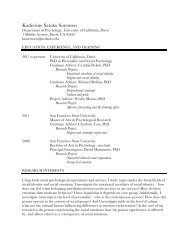Curriculum Vitae - Psychology - University of California, Davis
Curriculum Vitae - Psychology - University of California, Davis
Curriculum Vitae - Psychology - University of California, Davis
You also want an ePaper? Increase the reach of your titles
YUMPU automatically turns print PDFs into web optimized ePapers that Google loves.
- 16 -<br />
4. Maltas, S., Widaman, K. F., Hall, S., Reiss, A. L., Lightbody, A., Kaufmann, W. E., Berry-<br />
Kravis, E., Lachiewicz, A., & Hessl, D. (2011). Psychometric study <strong>of</strong> the Aberrant Behavior<br />
Checklist in fragile X syndrome and implications for targeted treatment. Journal <strong>of</strong> Autism<br />
and Developmental Disorders.<br />
5. Taylor, Z. E., Larsen-Rife, D., Widaman, K. F., & Conger, R. D. (2011). Familism, marital<br />
conflict and parenting in Mexican-origin families: A cultural-contextual framework. Journal<br />
<strong>of</strong> Marriage & Family.<br />
6. Orth, U., Robins, R. W., & Widaman, K. F. (2011). Life-span development <strong>of</strong> self-esteem<br />
and its effects on important life outcomes. Journal <strong>of</strong> Personality and Social <strong>Psychology</strong>.<br />
Chapters in Edited Books<br />
1. Gibbs, J. C., Widaman, K. F., & Colby, A. (1980). The sociomoral reflection measure. In L.<br />
Kuhmerker, M. Mentkowski, & V. L. Erickson (Eds.), Evaluating moral development and<br />
evaluating educational programs that have a value dimension (pp. 101-111). Schenectady,<br />
NY: Character Research Press.<br />
2. Petrinovich, L., & Widaman, K. F. (1984). An evaluation <strong>of</strong> statistical strategies to analyze<br />
repeated measures data. In H. V. S. Peeke & L. Petrinovich (Eds.), Habituation, sensitization,<br />
and behavior (pp. 155-201). New York: Academic Press.<br />
3. Kagan, S., Zahn, G. L., Widaman, K. F., Schwarzwald, J., & Tyrrell, G. (1985). Classroom<br />
structural bias: Impact <strong>of</strong> cooperative and competitive classroom structures on cooperative<br />
and competitive individuals and groups. In R. Slavin, S. Sharan, S. Kagan, R. Hertz-<br />
Lazarowitz, C. Webb, & R. Schmuck (Eds.), Learning to cooperate, cooperating to learn<br />
(pp. 277-312). New York: Plenum.<br />
4. Widaman, K. F., & Little, T. D. (1985). Contextual influences on sociomoral judgment and<br />
action. In J. B. Pryor & J. D. Day (Eds.), The development <strong>of</strong> social cognition (pp. 115-152).<br />
New York: Springer-Verlag.<br />
5. Carlson, J. S., & Widaman, K. F. (1986). Eysenck on intelligence: A critical perspective. In<br />
S. Modgil & C. Modgil (Eds.), Hans Eysenck: Consensus and controversy (pp. 103-132).<br />
Sussex, England: Falmer.<br />
6. Carlson, J. S., & Widaman, K. F. (1986). Carlson and Widaman reply to Jensen. In S. Modgil<br />
& C. Modgil (Eds.), Hans Eysenck: Consensus and controversy (pp. 135-136). Sussex,<br />
England: Falmer.<br />
7. Carlson, J. S., & Widaman, K. F. (1987). Elementary cognitive correlates <strong>of</strong> g: Progress and<br />
prospects. In P. A. Vernon (Ed.), Speed <strong>of</strong> information processing and intelligence (pp. 69-<br />
99). Norwood, NJ: Ablex.<br />
8. Widaman, K. F. (1991). Qualitative transitions amid quantitative development: A challenge
















